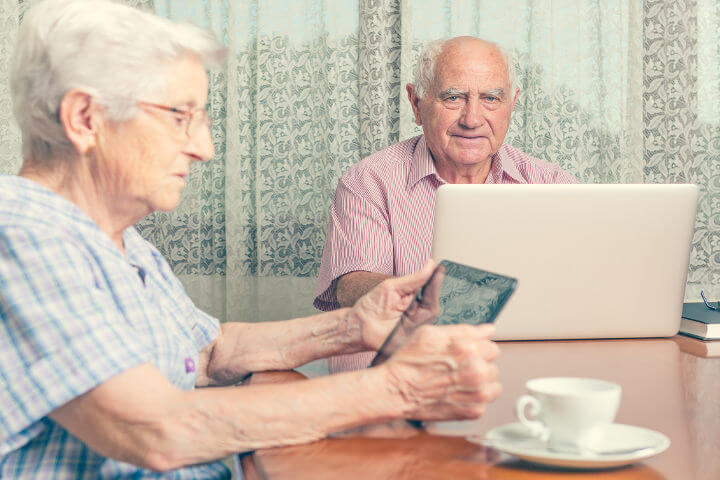
Living in the age of social media, it may be hard to imagine an environment in which people are not connected. A simple post on Facebook often garners responses from a wide variety of connections – friends from high school, elementary scout camp, a college roommate, girlfriends from the past, and colleagues from a previous job. Increasing technological advancements have radically changed social interactions. Where once it was that to connect with a friend you needed to knock on their door, the telephone shortened the distance. Now telephones are pocket-sized and oftentimes a voice-conversation isn’t even needed – just post photo on Instagram, send a tweet, or post on a preferred social media platform!
Even while social media has transformed how modern people think about connections and socialization today, it’s important to realize that the seniors among us have not – and, on the whole, will not – live into that world. Seniors need socialization opportunities for the sake of health and life, but they will not achieve those interactions electronically the way the fast-paced, electronically savvy young adults of today choose to engage.
Understanding the Need for Social Contact
Many seniors still living at home have been widowed or see a decrease in access to long-standing friendships, often due to relocation or even death. Additionally, family members do not always live nearby due to education or work. This means that regular contact with family is either limited or, if the family chooses to become primary caretakers, seniors are removed from their community and network of friends. Seniors and their loved ones need to carefully consider living arrangements that maximize socialization opportunities in order to promote a healthy, vibrant life.
People need regular interaction with people. Isolation promotes loneliness, which increases risks for depression, social anxiety, and stress. Furthermore, isolation increases physical problems. Regular interaction with others usually results in friends and family noticing the physical needs of seniors, resulting in both identification of and access to needed care. Seniors who live at home and not under the regular, watchful eye of a nursing or care facility need frequent interaction by loved ones and caregivers who notice their patterns and needs, and can therefore mitigate potential problems that can or may arise. Socialization is, simply put, frequent interaction with people who care. Whether it is a regular lunch date, local recreational activities, or entertaining in the home, socialization is critical for seniors living at home to thrive. Professional Fairfax home care services can provide companionship and support for seniors at home, helping them to thrive.
Community Socialization Opportunities
Socialization opportunities for senior citizens vary according to their access to transportation. Assisted living centers provide in-house opportunities for daily interaction with peers and caregivers, but at-home living requires greater breadth of creativity. Many communities offer public transportation services specifically for seniors, which is especially useful if a senior is no longer able to drive him or herself. Access to transportation may create opportunities for regular exercise at local gym facilities to participate in targeted senior activities such as aqua-aerobics, yoga, or the nationwide Silver Sneakers program.
Religious communities also often have a wide variety of offerings, ranging from in-home visits by religious leaders and meal delivery (for example, from nationally-recognized Meals on Wheels program), to regular weekly activities or gatherings. Even attending a weekly service provides regular, needed contact. Since most religious communities are delighted to have members, it may be useful to contact a local place of worship and inquire directly about organizing a weekly pick up/drop off for worship service.
Senior Centers
Much like children attend school and adults attend work, senior centers are useful gathering spaces in many communities for senior socialization and wellness. Seniors live at home, but come to engage others at an area center for regular contact. Community senior centers frequently offer options for seniors to serve their community as volunteers, including developing adjacent preschools for intergenerational interaction. Many centers are also affiliated with the Boys and Girls Club of America and Adopt-a-Grandparent programs. Centers are also cornerstones for valuable support programs, such as financial assistance, transportation information, community or wider travel offerings, and even employment and volunteer opportunities.
There may also be regular acknowledge of personal achievements or celebrations, such as birthdays and anniversaries, discussion groups, instrumental or vocal music groups, and other forms of group engagement. An effective, engaging senior center allows seniors to connect with those in their community for the sake of rote socialization and to both celebrate individual gifts and develop awareness about options for continued leadership and service.
Caring Hands Matter Is Ready To Help!
Seniors, like everyone else, need ample amounts of contact with others in order to encourage and maintain independence. A well-socialized person has regular contact with family, friends, and others who care that show an interest in their daily life and work, are willing to reminisce about the past, provide regular touch (hugs, handholding, etc.), and offer opportunities for further engagement. Think about the seniors in your life and whether they have regular, meaningful contact with others. For more information about how our Fairfax home care services provide social and other forms of support for the seniors in your life, please contact Caring Hands Matter online or call us directly.